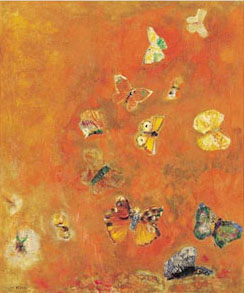So many years before
I could say now.
Now: Our words lean
against each other, mingling
with them: A voice
breaks low
with all the sounds we make,
and black silk ends
at the beaded tops of thighs.
Eyes look up
from just below the belly,
a gaze that sweats.
A wand shadows skin
in cursive letters of the sentence:
This is holy,
how strangers everyday are everywhere
gone to the air, the air,
the bodies we press tightly, unafraid.
Calligraphists
To make of likeness a confession
To make confession riotous
Emboldened, yes, by sky -- the tops
of cottonwoods budding by the river, the river itself
in its light and dark currents, the tips
of grasses bent down in sand and making circles
when the canyon's wind blows each dusk,
your fingers swirling up and down on skin, beads
trickling and scarves sliding like water
off backs to the hotel-room floor, a vine
and the menu's illustration of a vine,
rhizomes, the varieties of corona, a copse
backlit by fire, fire itself, smoke, ashes too,
the hair I blow on, blizzard-undulate snow, all deep breaths
of a planet's weather, pressure ridges, isobars,
mountain roads and coastlines, every topography,
including terrains of Europa and Callisto, swirls
of green jade, cirrus like years of innuendo
disintegrating among friends, certain
birdsongs, hawks on thermals before and as
they tumble talon-locked, the circling
walk and nosing into scent of myriad species,
the letters tongues trace on folds just shaven,
the slick declinations of hair
and your grasping and gasping then, tendrils that fire
in the brain, countless, time perhaps, the whole of time,
and, for some, the colors of sounds like the colors of mist
in a painting by Redon and the phrase just thought of --
"corniculate jumbles," which the poet Robert Desnos
would have loved because he too yearned for the
"Marvellous satisfactions of sight and touch, perfections of pleasure --
it is," he said, "by your mediation that my thought
can be in touch with death.
The fugitive character of love is also that of death," though it is not fugitive,
because that twinning and twining is the same grain
of fission tracks and insect flights, the grain of the floor
on which dancers dance their lithe austerities, their arms the arms
of spiral galaxies in which occur a nebula's thin accumulations, rococo
ceiling molds, lace brocades, the veins of cocks, even
the splay and tangle of many bodies
in a temple we've forgotten and echoing like fugues
are their moans, deeply
unashamed, strands of fluids among them
and skittering in air, consequent helix to sheer white fluting, fabrics rippling, these
and these, lines and curves and portions
of curves incessantly writing themselves then translations
of themselves, fine traceries, embedded curls, becoming manifest and manifold,
sanctified by telling, for, lover, if we sing
the praises of one, we sing together of others.
©2004 by Christopher Cokinos



